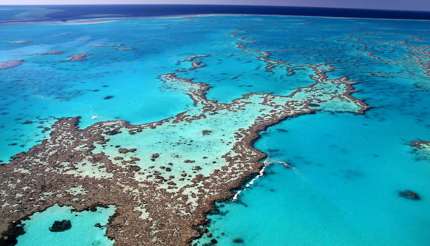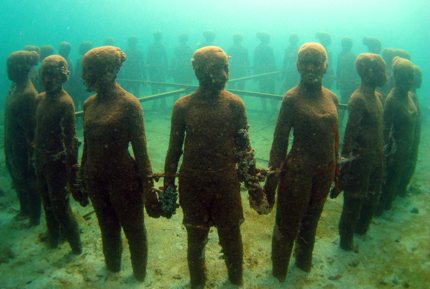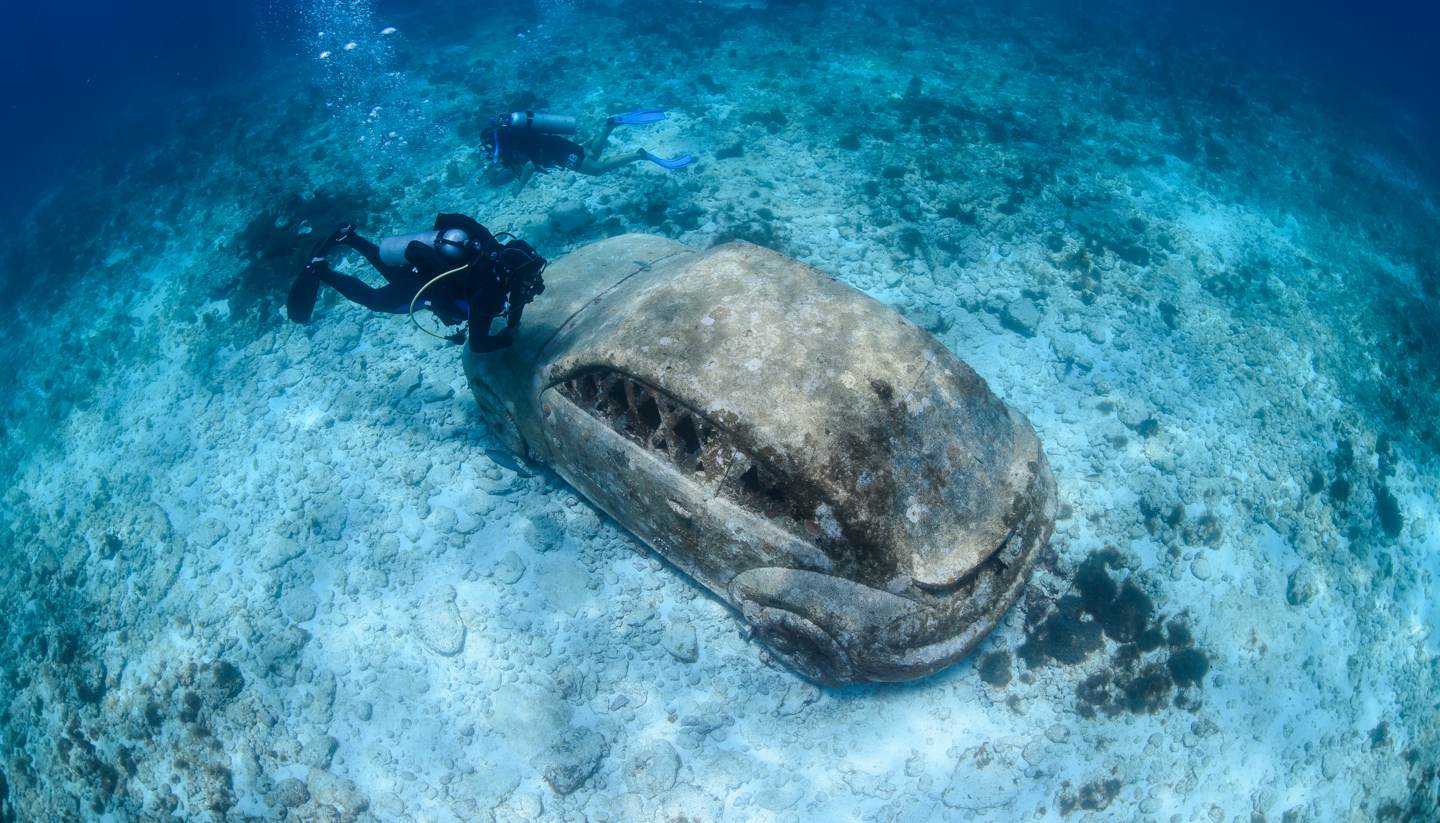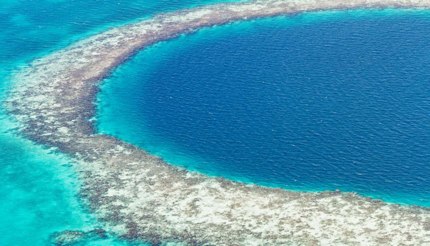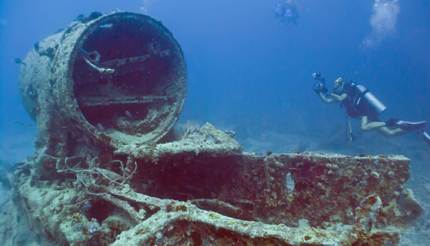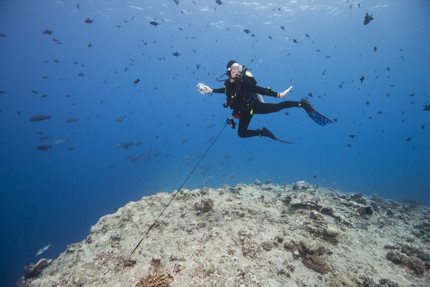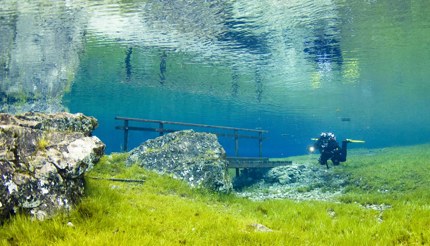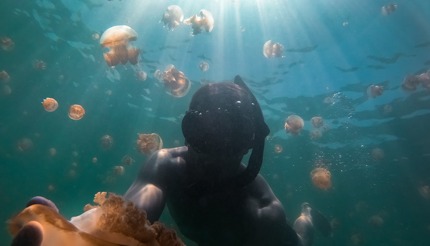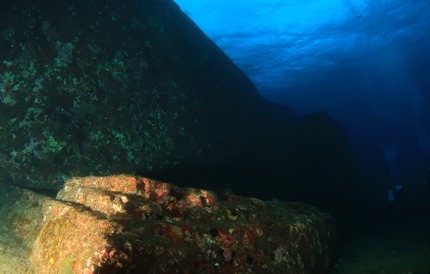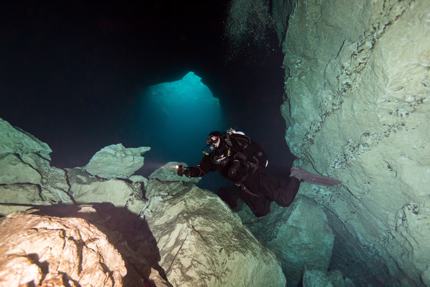From barrier reefs and blue holes to seabed sculpture parks, we don our wet suits and explore 20 of the best underwater attractions
1. Great Barrier Reef, Australia
A UNESCO World Heritage Site since 2017, the Great Barrier Reef is the world’s largest coral reef ecosystem.
This 1,400m (2,300km) reef, which can be seen from outer space, remains one of the seven natural wonders of the world. Its kaleidoscopic coral shelves are home to an abundance of marine life including 400 types of coral, 1,500 species of fish and 4,000 types of mollusc.
2. Underwater Sculpture Park, Grenada
Grenada’s dazzling west coast becomes even more spectacular when you dip below the waves and discover its sunken art museum.
The Underwater Sculpture Park, featuring installations by Jason deCaires Taylor and Troy Lewis, is located on the seabed and is the first of its kind. Man on a Bike, a life-size gent cycling along a reef and Viccisitudes, a circle of kids holding hands, are among the inspiring artworks that double up as a substrate for marine life.
3. Underwater Museum, Mexico
Opened in November 2010, the Cancún Underwater Museum (MUSA) devotes to the art of conservation.
Today, MUSA operates two galleries – Punta Nizuc is less than 4m (13ft) deep with 33 sculptures, and is for snorkelling tours only, while Manchones is 8m (26ft) deep with 473 sculptures, and correspondingly, is for scuba diving tours only.
4. Belize Barrier Reef, Belize
Charles Darwin described it as “the most remarkable reef in the West Indies” – a statement that still rings true today. Forming part of the Mesoamerican Barrier Reef, this underwater UNESCO World Heritage Site is home to a cornucopia of marine life, including 500 species of fish and over 100 species of coral.
The jewel in its crown though, is the Great Blue Hole, a large marine sinkhole that attracts divers from around the world.
5. S S Thistlegorm, Egypt
Sunk by German bombers in 1941, the trains, trucks, armoured vehicles and motorcycles aboard S S Thistlegorm never made it to their intended destination of Alexandria in Egypt.
The vessel was considered lost until local fishermen helped French explorer Jacques-Yves Cousteau pinpoint its remains near Ras Muhammad in the Red Sea in the 1950s. Now divers can discover the entire ship, including anti-aircraft machine guns and holes left by the bombs, in a single dive.
6. Blue Corner, Palau
With an astounding array of underwater life (think bright sea whips, darting reef sharks, flapping eagle rays, rich coral reefs and schools of pelagic fish), Blue Corner is considered by many as one of the best dive sites in the world.
Strong currents are a concern here – even experienced divers choose to hook themselves to the reef crest so they can remain safe while taking in one of the most breath-taking, below the surface sights known to man. The best time to dive there is from May to November.
7. Ithaa Undersea Restaurant, Maldives
If you’re looking for a unique seafood restaurant, Ithaa might be for you. Touted as the world’s first all-glass underwater restaurant, Ithaa made global headlines 2005. Today, its magical setting still offers diners an intimate dining experience.
Experience its four-course lunch menu or the six-course dinner menu in full view of fish and other marine creatures.
8. Green Lake, Austria
Beginning as a small lake in the winter, come summertime, Green Lake is transformed into a massive underwater landscape when snowmelt from the Karst Mountains floods the park, enveloping trees, bridges, and footpaths, making it virtually off-limits to anyone without diving gear. The best time to go is June when the water is at its highest.
9. Jules Undersea Lodge, USA
Airport transfers take on a new level of difficulty for guests of Jules Undersea Lodge in Key Largo. Nestled in a mangrove lagoon, some 9m (30ft) underwater, this former research laboratory can only be reached by experienced scuba divers.
Rooms are surprisingly spacious, and guests have the use of showers and a kitchen – a pizza delivery service is also available. If Florida’s marine life isn’t entertaining enough for you, the hotel has a decent collection of film, literature and music.
10. Underwater Theme Park, Bahrain
Bahrain has sunk a decommissioned 747 20m (66ft) to create an artificial reef in what is said to be the world’s largest underwater theme park, launched in June 2019. The country is in the process of designing an underwater pearl merchant house and will sink other decommissioned ships in the coming years.
11. The Manta Resort’s Underwater Room, Zanzibar, Tanzania
A truly spectacular hideaway in the Indian Ocean, this floating structure has a sea-level landing deck, a rooftop for sunbathing and stargazing and underwater spotlights that bring the surrounding underwater world to life.
The luxury underwater retreat also boasts an open-air freshwater shower, an eco-friendly marine toilet system and a small hand-wash basin. Also, your discreet security guard will be anchored to a buoy not far from the room, giving you enough privacy yet able to assist should you need it.
13. Kakaban, Indonesia
The largest lake on the Kakaban Island in East Kalimantan, Indonesia, is filled with stingless jellyfish. Due to being confined to the lake with no predators to worry about, these jellyfish have lost their natural defences. A swim here will allow you to witness other phenomena, like the box jellyfish is smaller than its deadly counterparts in places outside the lake, the spotted jellyfish has lost its spots, and the Cassiopeia jellyfish swims upside down.
14. Sandfalls, Mexico
This kind of phenomenon seems more suited to a fantasy film than the coast of Cabo San Lucas in Mexico. The sandfalls are a twist on your traditional waterfall, with strong currents causing sand to slip from underwater coastal shelves down into a deep 120m (400ft) abyss.
Cabo’s sandfalls were originally discovered by the famous diver Jacques Cousteau and are home to over 300 species of marine life, including barracuda, reef sharks and octopi.
15. Yonaguni Monument, Japan
Several intriguing rock formations off the Japanese island of Yonaguni have mystified scholars since their discovery in 1987.
Debate rages over whether these structures, which look like some sort of underwater temple, are man-made or a quirk of nature. Some experts, including Masaaki Kimura, a professor from the University of the Ryukyus, have gone one step further, suggesting the formations are ruins of the mythical lost city of Mu.
16. Underwater post office, Vanuatu
A gimmick that generated much media coverage when it opened, this underwater post office (Port Vila) is located off the coast of Hideaway Island in Vanuatu. Travellers can don full dive gear or a snorkel and fins to post their waterproof postcards, either at the post box or the manned counter.
17. The lost city of Heracleion, Egypt
The ancient Egyptian port of Heracleion, founded in 8 BCE, disappeared under the waves around 1500 years ago and its existence had long since descended into myth until it was rediscovered in 2000 by archaeologist Frank Goddio.
The underwater city now lies 6.5km (4 miles) off the coast of Aboukir Bay near Alexandria, where archaeologists have discovered the remains of giant religious statues, ancient ships and, most intriguingly, dozens of small limestone sarcophagi believed to have once contained mummified animals.
18. Neptune Memorial Reef, USA
The largest man-made reef ever created, Neptune Memorial in Florida is an underwater burial site, where people can have their cremated remains mixed with cement to help create an artificial reef.
The submarine cemetery has served as a unique destination for visitors and as a permanent memorial for those with a love of the ocean. Created by renowned sculpture artist, Kim Brandell, the site was inspired by the Lost City of Atlantis.
19. Toyama, Japan
Between Mach and May every year, the shoreline of Toyama Bay light up with a strange glow of blue made by thousands of bioluminescent firefly squid.
If you don’t want to take a boat trip out to the freezing Sea of Japan to witness this stunning occurrence at night, head to the Firefly Squid Museum in Namerikawa and learn about this stunning creature instead. The museum also sells snacks made from Firefly Squid.
20. Kilsby Sinkhole, Australia
The location of Kilsby Sinkhole is highly unusual – it is in the middle of a sheep farm, some 450km (280 miles) south of Adelaide in Australia. Considered as one of the best sinkhole dive sites due to its superb visibility, Kilsby welcomes snorkelers, freedivers and scuba divers.
After a dive, you can sip the Sinkhole Gin made locally from native botanicals and crystal clear limestone-filtered water. Bliss.
If you liked this article, you might also like:
